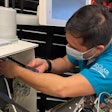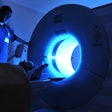Legislation in North Carolina, if passed, will require original equipment manufacturers (OEMs) to support hospital and independent repair providers who work on medical imaging and radiation therapy equipment in the state, starting July 1.
Breaking from right-to-repair laws that have generally excluded medical equipment, 2025 H 460 takes direct aim at medical imaging and radiation therapy devices. The short title is the Medical Equipment Right to Repair Act.
In long form, the Medical Equipment Right to Repair Act is an act to require OEMs of medical imaging equipment and medical radiation therapy equipment to provide equipment owners and repair providers access to the support documents, tools, and parts necessary to perform diagnostic, maintenance, and repair services on the equipment, according to the draft introduced March 20.
This is the second time such an act has been introduced in North Carolina. One of the bill's sponsors, Rep. Mary Belk (D-Mecklenburg), has said hospitals and community clinics across North Carolina should have the right to decide the best way to keep their equipment running.
For and against
In 2023, Belk and others backed H 752. At the time, 79 clinical engineers and biomedical repair technicians, also known as biomeds and biomedical-equipment technicians, signed on to a letter supporting the bill, citing times when repair restrictions limited their ability to do their jobs and put patient safety at risk.
Staunchly against medical device right to repair, the Advanced Medical Technology Association (AdvaMed) has pointed out that "unauthorized third-party servicers are not required to follow U.S. Food and Drug Administration (FDA) regulations or support adverse events," among other concerns.
However, the FDA hasn't been silent on that. FDA's last comprehensive report on the issue was in 2018. The agency said there was "objective evidence indicating that many OEMs and third-party entities provide high-quality, safe, and effective servicing." Also, the FDA said that "the continued availability of third-party entities to service and repair medical devices is critical to the functioning of the U.S. healthcare system."
FDA on right to repair
To address industry concerns, the FDA planned to do the following:
- Promote the adoption of quality management principles.
- Clarify the difference between servicing and remanufacturing.
- Strengthen cybersecurity practices associated with servicing of medical devices.
- Foster evidence development to assess the quality, safety, and effectiveness of medical device servicing.
Toward those ends, as of January 1, 2025, the FDA had added an element to form FDA-3500 (MedWatch Forms for FDA Safety Reporting) asking if a device has been serviced by a third-party servicer. In addition, the agency laid out six guiding principles for evaluating whether an entity's activities on a medical device constitute remanufacturing and could subject the device to additional regulation.
"For many years now, FDA has been working to gain additional perspectives on the distinction between servicing and remanufacturing of medical devices and has undertaken several efforts to help promote clarity between these activities," stated FDA regulatory adviser Frances Wilder during a webinar in September 2024, FDA's Final Guidance: Remanufacturing of Medical Devices.
The issues are tricky as the design and functionality of MRI, CT, and ultrasound machines have evolved well beyond hardware and parts.
Digital locks, lawsuits
In recent years, litigation has focused on OEMs' "digital locks" that prevent third-party repairers and servicers from accessing critical information, such as medical imaging equipment error logs for example. OEMs are fighting to protect their device software and data files -- they hold copyrights to the software that is useful to diagnose, maintain, and service those devices.
"Although OEMs typically make some copyrighted materials useful to service their machines available either for free or for a licensing fee, in light of the technological complexity of some devices, OEM technicians (who are subject to extensive federal regulations that ISOs are not) can more safely use OEM proprietary software," AdvaMed and the Medical Imaging and Technology Alliance (MITA) said in a November 2024 court filing.
MITA, a division of the National Electrical Manufacturers Association (NEMA), was joined by AdvaMed in challenging the Library of Congress to protect copyrighted software used for servicing and repairing medical devices, such as ultrasound and PET scanners, to safeguard that software and ensure the safety and privacy of patients who use the devices, a spokesperson for NEMA’s MITA division told AuntMinnie in an email.
That case is now on remand to the U.S. District Court for the District of Columbia. The key issue is a federal Digital Millennium Copyright Act (DMCA) medical device exemption that was granted in October 2021 and renewed in October 2024. This exemption opens access to more of the inner data and software workings of medical equipment.
Hospital costs
All this leaves hospital groups in a precarious position. Medical device maintenance, servicing, and repair are handled in several ways, including using in-house service technicians, contracted firms, and independent service organizations (ISOs), or a combination of approaches. What teams can and can’t do is also governed by end-user license agreements and other service contracts with OEMs.
Diagnosing medical equipment and device malfunctions has become harder and more costly due to software locks, called technological protective measures (TPMs), put in place by OEMs, say clinical engineers and hospital imaging department managers who have spoken out for change.
Large sophisticated systems such as MRI and catheterization and angioplasty x-ray systems are completely controlled by computers integrated into the systems and can only be serviced with software integrated into the systems, according to filings from court challenges, among them Avante Health Solutions, a provider of refurbished medical systems and devices; post warranty repair, diagnosis, and maintenance of medical systems and devices; and new and used parts.
Triennial rulemaking
In a potential win, third-party operators like Avante successfully petitioned to renew the DMCA exemption to access computer programs that are contained in and control the functioning of medical devices or systems, and related data files, when circumvention is a necessary step to allow the diagnosis, maintenance, and repair. This was reflected in October 2024 triennial section 1201 rulemaking.
Notably, "the petitions demonstrated the continuing need and justification for the exemption, for example stating that 'the use of TPMs in medical systems and devices is widespread' and that manufacturers 'have developed new systems that further restrict access to use of necessary software tools,'" stated a subpart to the final rule. "Petitioners also emphasized that this exemption makes possible device repair and maintenance services that ensure continuity and efficiency of patient care."
Legal challenges lodged by AdvaMed and MITA over the DMCA exemption have been going back and forth since 2022. The trade groups are seeking declaratory and injunctive relief to set aside the DCMA exemption, declare it unlawful and void, and ultimately prohibit the exemption's implementation.
DCMA exemption
If DCMA reform prevails, it will be positive for independent service when it comes to medical devices, but the exemptions will need to be renewed or made permanent in future rulemakings, according to Dentons U.S. Intellectual Property and Technology Group, which has coordinated some of the complaints and proceedings. Dentons cautioned, though, that compliance with other applicable laws and regulations is still required.
Sustained DCMA exemptions in the category of medical devices could potentially reduce healthcare costs through competitive repair options and improve equipment uptime in medical facilities, Dentons said.
In the meantime, H 460 in North Carolina, if successful, could be a bellwether of hospitals and health systems potentially having more bargaining power in medical imaging and radiation therapy equipment maintenance and repair. Likewise, if a similar bill is successful in Vermont, (H 106), it would also go into effect this summer.




















